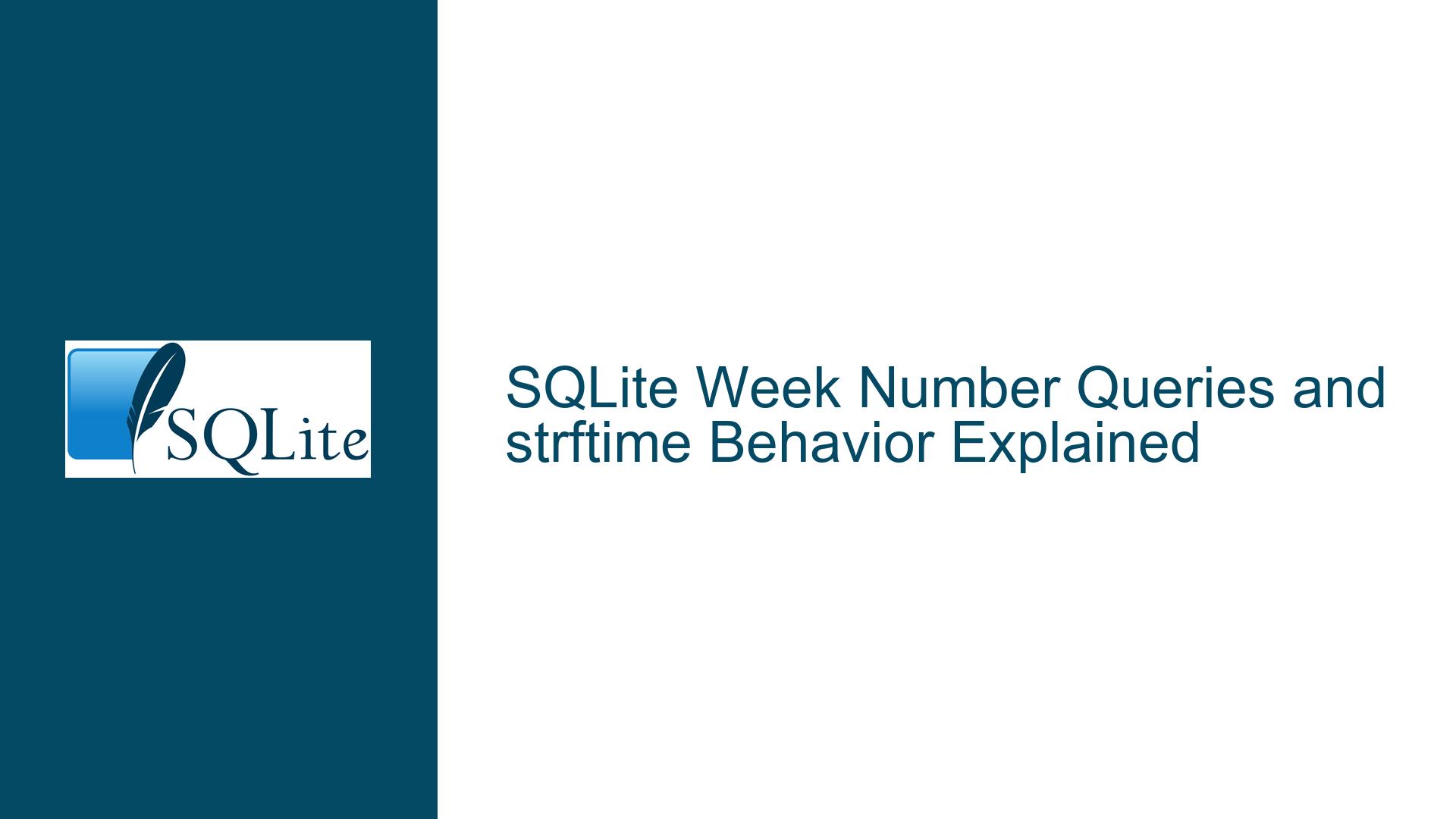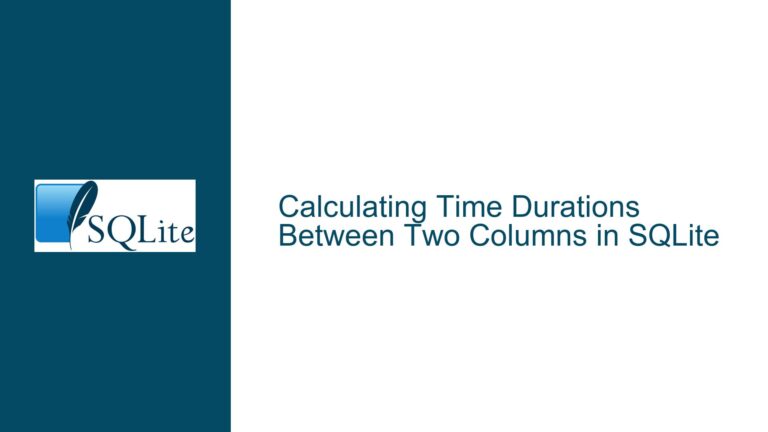SQLite Week Number Queries and strftime Behavior Explained
Issue Overview: Week Number Calculation and strftime Mismatch in SQLite
The core issue revolves around the behavior of SQLite’s strftime function when calculating week numbers and filtering records based on those week numbers. Specifically, the problem arises when attempting to filter records that do not belong to a specific week number (e.g., week 17). The query appears to return incorrect results, where records that should be excluded are instead included, and the week number returned by strftime in the SELECT clause does not match the week number used in the WHERE clause.
The confusion stems from the fact that strftime('%W', ...) returns a string representation of the week number, while the comparison in the WHERE clause is performed against an integer. This type mismatch leads to unexpected behavior, as SQLite’s type affinity rules come into play, causing the comparison to fail silently or produce incorrect results.
Additionally, the discussion highlights the limitations of SQLite’s strftime implementation, particularly the absence of ISO 8601 week number support (%V), which is commonly used in European countries. This limitation forces developers to implement workarounds or patches to achieve the desired functionality.
Possible Causes: Type Mismatch and Week Number Definition Ambiguity
The primary cause of the issue is the type mismatch between the string returned by strftime('%W', ...) and the integer used in the WHERE clause. SQLite’s strftime function returns a text value, and when this text value is compared to an integer, SQLite attempts to perform implicit type conversion. However, this conversion does not always yield the expected results, especially when dealing with week numbers.
Another contributing factor is the ambiguity in how week numbers are defined. The %W format specifier in strftime calculates the week number based on the first Monday of the year as the start of week 01. However, this definition may not align with other week numbering systems, such as ISO 8601, which defines week 01 as the first week with at least four days in the new year. This discrepancy can lead to confusion when working with week numbers across different systems or regions.
Furthermore, the absence of certain strftime format specifiers, such as %V (ISO 8601 week number), %u (ISO 8601 weekday), and %G (ISO 8601 year), limits the functionality of SQLite for developers who rely on these standards. This limitation forces developers to implement custom solutions or patches, as demonstrated in the discussion.
Troubleshooting Steps, Solutions & Fixes: Resolving Week Number Issues in SQLite
To address the week number calculation and filtering issues in SQLite, follow these steps:
Explicit Type Conversion: Ensure that the week number returned by
strftimeis explicitly converted to an integer before performing comparisons. This can be achieved by using theCASTfunction or adding0to the result ofstrftimeto force integer conversion. For example:SELECT strftime('%W', StartTime, 'unixepoch', 'localtime') FROM Records WHERE CAST(strftime('%W', StartTime, 'unixepoch', 'localtime') AS INTEGER) <> 17;or
SELECT strftime('%W', StartTime, 'unixepoch', 'localtime') FROM Records WHERE (0 + strftime('%W', StartTime, 'unixepoch', 'localtime')) <> 17;ISO 8601 Week Number Support: If ISO 8601 week numbers are required, consider applying a patch to SQLite’s
date.cfile to add support for the%V,%u, and%Gformat specifiers. The patch provided in the discussion by Harald Hanche-Olsen implements these specifiers and can be integrated into the SQLite source code. This patch allows for accurate ISO 8601 week number calculations and comparisons.Custom Week Number Calculation: If modifying the SQLite source code is not an option, implement a custom week number calculation using SQL queries. This approach involves calculating the week number based on the ISO 8601 definition and using it in your queries. For example:
WITH WeekNumbers AS ( SELECT StartTime, (strftime('%j', StartTime, 'unixepoch', 'localtime') + (7 - strftime('%w', StartTime, 'unixepoch', 'localtime'))) / 7 AS WeekNumber FROM Records ) SELECT StartTime, WeekNumber FROM WeekNumbers WHERE WeekNumber <> 17;Testing and Validation: After implementing any of the above solutions, thoroughly test the queries to ensure that the week number calculations and comparisons are accurate. Use a variety of test cases, including edge cases such as the first and last weeks of the year, to validate the results.
Performance Considerations: Be mindful of the performance impact of custom week number calculations, especially when working with large datasets. Consider indexing the calculated week numbers or using precomputed values to improve query performance.
Documentation and Best Practices: Document the chosen solution and any custom implementations to ensure consistency and maintainability. Share best practices with your team or community to help others avoid similar issues.
By following these steps, you can effectively resolve the week number calculation and filtering issues in SQLite, ensuring accurate and reliable results in your queries. Whether through explicit type conversion, custom calculations, or source code modifications, the key is to understand the underlying causes and apply the appropriate solution for your specific use case.






